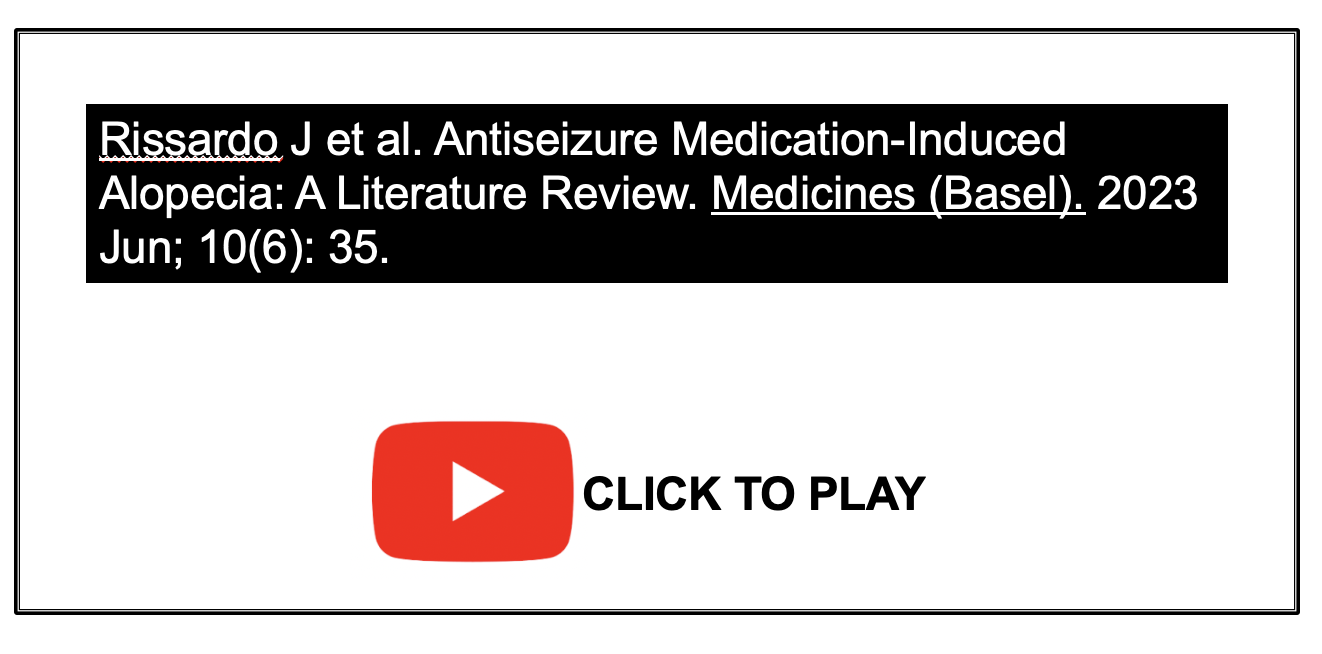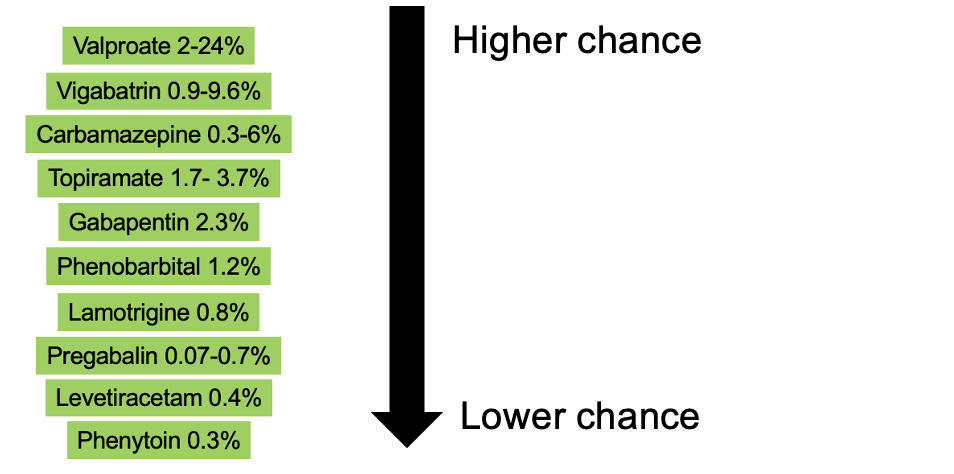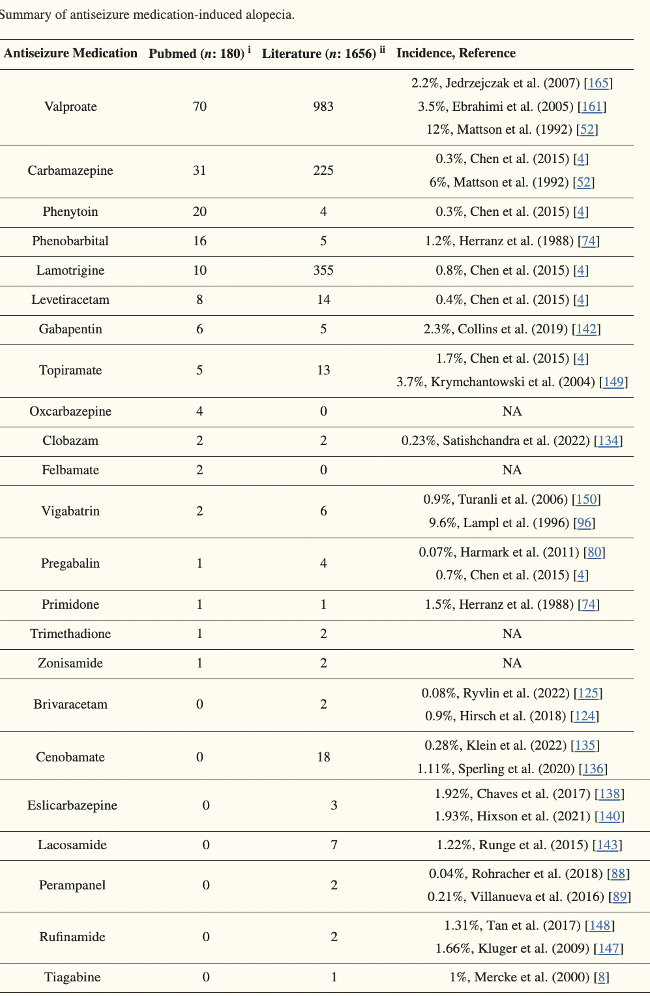Hair Loss with Anti-seizure Medications: Valproic Acid Tops the List
A New Review Highlights the Prevalence of Hair Loss with Antiseizure Medications
Epilepsy is a type of neurological disorder caused by unusual nerve cell activity in the brain. It is associated with recurring, unprovoked seizures. Epilepsy is common. A 2015 study suggested that 1 % of the US population had active epilepsy. Over a lifetime, 1 out of 26 people will be diagnosed with epilepsy.
Rissardo et al 2023
A new report summarizes the frequency of hair loss with various antiseizure medications (ASMs). The authors remind us that the mainstay of treatment for epilepsy is antiseizure medications (ASMs) and that overall about 70% of individuals with epilepsy will reach a seizure free state with adequate ASMs treatments.
Hair loss is a common reason for patients to stop ASM’s so the hair loss specialist needs to know about this. In a 2012 study by Perucca et al, weight gain and hair loss were the most common reasons why patients stopped their ASM’s.
Authors of a new study sought to review the literature regarding the frequency of hair loss with antiseizure medications. They searched widely using various terms and found 115 studies with 1656 individuals reporting ASM induced alopecia.
Reports in the literature included the following number of reports of hair loss:
Valproate (983), lamotrigine (355), and carbamazepine (225) cenobamate (18), levetiracetam (14), topiramate (13), lacosamide (7), vigabatrin (6), phenobarbital (5), gabapentin (5), phenytoin (4), pregabalin (4), eslicarbazepine (3), brivaracetam (2), clobazam (2), perampanel (2), trimethadione (2), rufinamide (2), zonisamide (2), primidone (1), and tiagabine (1)
Hair Loss According to specific Anti-Seizure Medications
Valproate (VPA)
VPA is a common medication for treating generalized and focal seizures. This drug is also indicated for managing bipolar disorders, neuropathic pain, and migraine prophylaxis. The incidence of alopecia secondary to VPA greatly varies but estimates suggest numbers ranging from 0.5 to 24%. Hair loss most commonly occurs after three to six months of starting VPA. The mechanisms may be a telogen effluvium but other mechanisms are possible such as biotin deficiency, hyperandrogenism, mineral deficiency and vitamin D deficiency
Carbamazepine (CBZ)
CBZ is often used to treat focal seizures and can be used to treat bipolar disorder and trigeminal neuralgia. The incidence of alopecia with CBZ ranges from 0.3% to 6%. Hair loss may occur 2-4 months.
Lamotrigine
LTG is used to treat epilepsy and is a first-line treatment for primary generalized tonic–clonic seizures, focal seizures, atypical absence seizures, myoclonic seizures, and atonic seizures. The authors report that the incidence of LTG induced hair loss is around 0.8%. Interestingly, Chen et al showed that three in every four individuals who actually go on to develop LTG-induced alopecia reported this side effect as a significant factor for LTG withdrawal.
Levetiracetam (Keppra)
LEV was approved by the FDA in 1999 for the management of epilepsy. It rarely causes hair loss. In a study in 2015 by Chen et al with 1903 individuals, a 0.4% prevalence of hair loss due to LEV therapy was observed. Hair loss secondary to LEV was observed to occur between three and eight weeks of LEV therapy.
Gabapentin
Gabapentin is a first-line treatment for the management of neuropathic pain. We often used it in dermatology for treating scalp pain syndromes. A 2009 study by Eker et al showed hair loss has been reported even after one week or treatment. A study by Collins suggested it may cause hair loss in around 2 % of users.
Topirmate (TPM)
TPM may cause alopecia in about 1-1.7% of its users . Hair loss generally occurs after 2-3 months (if it will occur at all).
Phenytoin
Phenytoin has been estimated to cause hair loss in 0.3 % of users
Pregabalin
Hair loss with Pregabalin (Lyrica, etc is not common) Chen et al. found only one patient who developed alopecia among 143 PGB users.
Others ASMs
Hair loss with preampanel was estimated at under 0.05 %. Phenobarbital-induced isolated alopecia was rarely described. Vigabatrin has also been reported to cause hair loss with a range of estimates from 0.9 to 9.6 %. In a 1996 study by Lampl et al., 5 out of 52 patients who received vigabatrin for focal seizures experienced moderate hair loss or changes in hair structure. The complaints began after three to seven weeks of initiating vigabatrin treatment. Authors estimated an incidence of 1% of tiagabine-induced alopecia
Discussion and Summary
Most studies in the medical literature of ASM-induced alopecia are with three drugs – valproic acid, carbamazepine and lamotrigine. The rest of the anticonvulsants are uncommonly reported in the literature as causes of hair loss.
Estimated prevalence of ASM induced alopecia are shown in the charts below with the first being a quick summary and then second being the table from the authors’ very nice paper.
Authors’ Summary of Antiseizure medication induced alopecia
Estimated Prevalence of Hair loss with Anti-seizure medications. From Jamir Pitton Rissardo et al. Antiseizure Medication-Induced Alopecia: A Literature Review. Medicines (Basel). 2023 Jun; 10(6): 35. Table used with creative commons license.
REFERENCE
Rissardo J et al. Antiseizure Medication-Induced Alopecia: A Literature Review. Medicines (Basel). 2023 Jun; 10(6): 35.
Perucca P., Gilliam F.G. Adverse effects of antiepileptic drugs. Lancet Neurol. 2012;11:792–802. doi: 10.1016/S1474-4422(12)70153-9.
Chen B., Choi H., Hirsch L.J., Moeller J., Javed A., Kato K., Legge A., Buchsbaum R., Detyniecki K. Cosmetic side effects of antiepileptic drugs in adults with epilepsy. Epilepsy Behav. 2015;42:129–137. doi: 10.1016/j.yebeh.2014.10.021.
Eker H.E., Cok O.Y., Aribogan A. Alopecia associated with gabapentin in the treatment of neuropathic pain. J. Pain Symptom Manag. 2009;37:5–6. doi: 10.1016/j.jpainsymman.2008.09.001.
Mercke Y., Sheng H., Khan T., Lippmann S. Hair loss in psychopharmacology. Ann. Clin. Psychiatry. 2000;12:35–42. doi: 10.3109/10401230009147085.
Rohracher A., Zimmermann G., Villanueva V., Garamendi I., Sander J.W., Wehner T., Shankar R., Ben-Menachem E., Brodie M.J., Pensel M.C., et al. Perampanel in routine clinical use across Europe: Pooled, multicenter, observational data. Epilepsia. 2018;59:1727–1739. doi: 10.1111/epi.14520
Lampl Y., Gilad R., Sarova-Pinchas I., Barak Y. Hair loss-an adverse reaction to treatment with vigabatrin. Acta Therap. 1996;22:51–55.
Collins A., Mannion R., Broderick A., Hussey S., Devins M., Bourke B. Gabapentin for the treatment of pain manifestations in children with severe neurological impairment: A single-centre retrospective review. BMJ Paediatr. Open. 2019;3:e000467. doi: 10.1136/bmjpo-2019-000467.
This article was written by Dr. Jeff Donovan, a Canadian and US board certified dermatologist specializing exclusively in hair loss.



